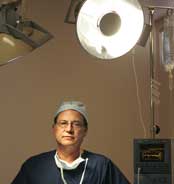Search
Corona Del Mar doctor a 'specialty anesthesiologist'
Dr. Barry Friedberg has trademarked what he calls 'minimally invasive anesthesia' for cosmetic surgery.
| By BLYTHE BERNHARD The Orange County Register George Clooney didn't play one. Neither does Patrick Dempsey. Hollywood just doesn't build shows around anesthesiologists. On TV, all the glory for saving lives and uncovering medical mysteries seems to go to surgeons. But anesthesiologists? Can you name even one? Dr. Barry Friedberg of Corona del Mar wants to change all that. He markets himself to patients as a "specialty anesthesiologist," wooing people who are considering cosmetic surgery but are worried about the post-sedative bout of vomiting that can come with it. Friedberg even trademarked his own slogan – "minimally invasive anesthesia." His Web site, www.doctorfriedberg.com, boasts more than 3,000 hits monthly. He says he assists in up to 250 surgeries a year, mostly tummy tucks and face lifts. |
YOU MIGHT CALL IT ANESTHESIA LIGHT: Dr. Barry Friedberg, an anesthesiologist, has trademarked his technique, "minimally invasive anesthesia." It's for patients undergoing outpatient cosmetic surgery. MARK RIGHTMIRE, THE ORANGE COUNTY REGISTER |
What's minimally invasive anesthesia?
It's anesthesia without violence. Patients wake up pain-free, nausea-free and hangover-free.
Tell us about the drug cocktail you pioneered – "PK."
It's a martini. Propofol is the vodka. Ketamine is the olive. It's moderate sedation.
What's different about people who go in for cosmetic surgery?
They don't have to have the surgery in the first place. People who sign up for elective surgery know they'll have some discomfort. The patients prefer to suffer with pain than be sick to their stomachs.
Why are they more worried about nausea than pain?
If you're throwing up after face lifts and tummy tucks, you can spoil the effect. There can be bleeding.
These are people who are concerned about their looks. They're higher-strung already, more than someone with a broken bone.
Why should anesthesia be tailored for cosmetic surgery?
The No. 1 bad outcome from any anesthesia is death. And it's especially hard to accept the death of somebody for a surgery they didn't have to have.
Many anesthesiologists use heart rate and blood pressure to make sure people are medicated enough during surgery. Why do you use a brain-wave monitor?
It's like cheating. It makes anesthesia an open-book test. You don't give more medicine than you need to do the job.
(During surgery), you're creating an insult to the body while fooling the brain. The brain is a lot smarter than the anesthesia trying to medicate it.
The logic is obvious. (Patients) don't want to hear us. They don't want to feel us. They don't want to remember us.
What do other, more traditional anesthesiologists think of you?
They'll never invite me to speak to the national society. There's a fear of giving their job to technology.
Why did you switch (in 1992) to anesthesia for cosmetic surgery, from open-heart surgery?
I got burned out on hearts. I got tired of people trying to die on me. Insurance and managed care took all the fun out of practice.
What kind of relationship do you have with your patients?
I love the amount of contact with the patient. I like to hold my patient's hand, with their permission, when they go to sleep. No extra charge.
People love me because they confuse happiness from the drug with happiness from Dr. Friedberg.
Have you had cosmetic surgery?
I had a hair transplant under local (anesthesia) and felt it. I had love handles sucked seven years ago.
What happens after your book on minimally invasive anesthesia comes out in November?
This book is a stepping-stone to getting on Oprah. I'm not trying to promote myself, (just) a better way.
I've had the answer for 14 years. The question is, will anybody listen?

